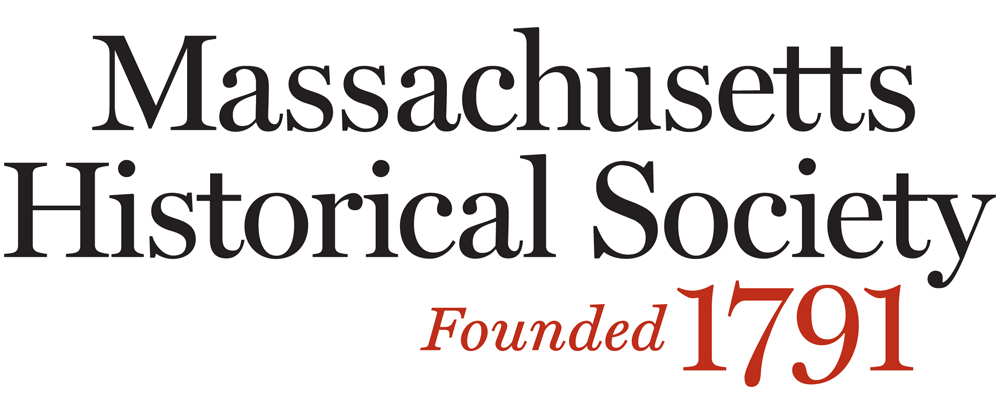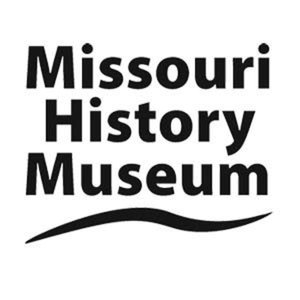from Apr. 15, 1865
Sarah Gooll Putnam Diary
-
Full Title
Sarah Gooll Putnam diary 7 excerpt, entries for 13-17 April 1865
-
Description
Sarah Gooll Putnam, a teenager (who was 14 years old in during the spring 1865 and lived primarily in Boston, Massachusetts), describes the shock and sadness of hearing about the assassination of Abraham Lincoln. Her diaries (started in 1860, when she was 9, and continued until close to the time of her death at age 61 in 1912) feature many illustrations. The entry for 15 April 1865 includes a minimalist sketch of a face with a shocked expression.
-
Transcription
31 April
Glee. The little dog was taken away by John
I read [?] [?], and check home
Lousia came in in the morning and so did
Mr. Greenrough and Mr. Baron.
13 Thurs. I packed up some of my things and
Stayed to alice Russels to drink tea, where I
Stayed awfully late
14 Frid. Packing went on at a great rate. Just
Think, we shall be out of this house Monday
Or Tuesday. I went to Aunt Lousia’s to tea
Grandma Upham came to our house for her’s.
15th Sat. Now guess my feelings when
Coming down to breakfast as Mother’s saying
“The President is killed!” I stood so for
A few minutes without speak -
Ing. I can not realize it yet-
Poor, dear, old, abe, [?] of
Will kill how his death came
On without any sentiment for that over
No good. Last night he went with Mrs.
Lincoln to see “Our American Cousin” [?]
([?] - Washington) During one of the acts
A justice shot was heard and a shriek
From Mrs. Lincoln and before people
Could collect their [?] a man flourishing
A knife strung from the boy by President
Lincoln, dashed onto the stage, said “[?] [?]
[?]” and rushed off. Now President
L is dead, dear old kind Abe. An attempts
Was made on Mr. Seward’s life too, who was
Sick in his bed. An assasin came into the room
Under pretense of somebody sent from a
doctor or something like that. He almost
Succeeding in assasinating both Mr. Seward
and his son who was in the same room
With his father. Everybody’s house almost
Is just in mourning for Abraham Lincoln
The houses are drafted with black and white
16th Sun. The sermon was almost entirely about
The [?] assassination.
17th Mon. Mother cleaned out the house, and
I went to Aunt Louisa’s to tea. Many and
[?] went to Grandma Upham’s.
18th Tues. There was an question at our house
It was rather mournful coming home from
School to see loads of furniture going from
Our house that we never shall sleep in
Again! Bridget, Hannah and many [?]
Walked round this house [?] the [?] with
Robin in Bridget’s [?] She bought the kitchen
[Transcription by: Megan Klein, Rachel Engl's class, Lehigh University] -
Source
Massachusetts Historical Society, Ms. N-758
-
Rights
Use of this item for research, teaching, and private study is permitted with proper citation and attribution, as: From the Collection of the Massachusetts Historical Society. Reproduction of this item for publication, broadcast, or commercial use requires written permission. For permission, please see this web page.
-
Tags
-
Cite this Item
Putnam, Sarah Gooll. "Sarah Gooll Putnam diary 7 excerpt, entries for 13-17 April 1865". Remembering Lincoln. Web. Accessed June 30, 2025. https://rememberinglincoln.fords.org/node/285
from Apr. 15, 1865
Sarah Gooll Putnam diary 7 excerpt, entries for 13-17 April 1865
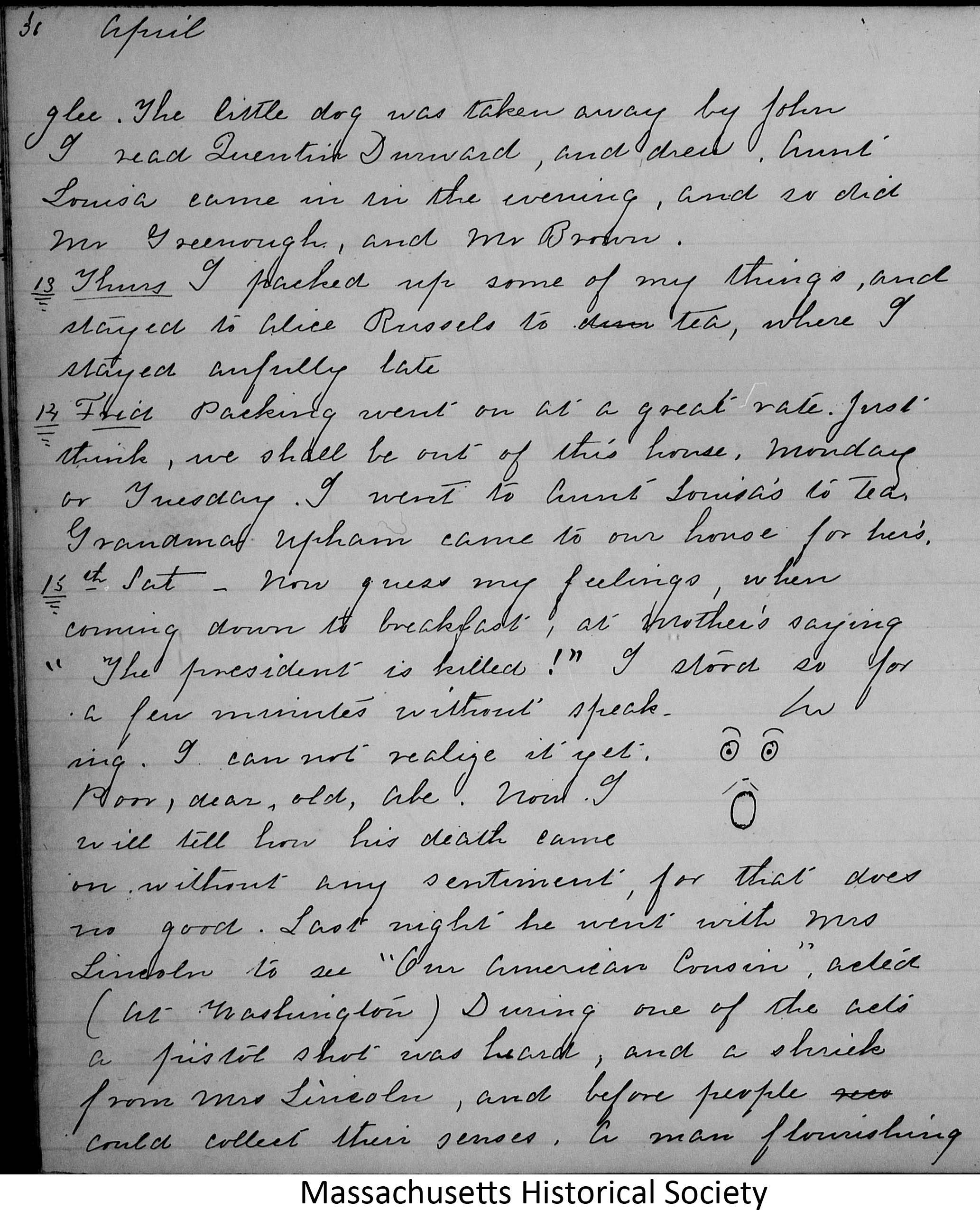
-
Description
Sarah Gooll Putnam, a teenager (who was 14 years old in during the spring 1865 and lived primarily in Boston, Massachusetts), describes the shock and sadness of hearing about the assassination of Abraham Lincoln. Her diaries (started in 1860, when she was 9, and continued until close to the time of her death at age 61 in 1912) feature many illustrations. The entry for 15 April 1865 includes a minimalist sketch of a face with a shocked expression.
-
Source
Massachusetts Historical Society, Ms. N-758
-
Rights
Use of this item for research, teaching, and private study is permitted with proper citation and attribution, as: From the Collection of the Massachusetts Historical Society. Reproduction of this item for publication, broadcast, or commercial use requires written permission. For permission, please see this web page.
-
Creator
Putnam, Sarah Gooll
-
Date
April 15, 1865
from Apr. 16, 1865
Nathan D. Allen Diary
-
Full Title
Nathan D. Allen diary, 1834-1888
-
Description
Nathan D. Allen was born May 15, 1819, at Watkins Glen, New York, and came to St. Louis in 1837, eventually settling in Webster Groves, St. Louis County, Missouri, where he died May 9, 1903. The diary of Nathan D. Allen contains material on life in Webster Groves, with accounts of the 1849 cholera epidemic and the Civil War in St. Louis, and mentions meeting Abraham Lincoln and Henry Shaw. (Additional information on Allen family was added later by donor.)
-
Source
Missouri History Museum
-
Rights
This item is in the public domain.
-
Tags
-
Cite this Item
Allen, Nathan D., 1819-1903. "Nathan D. Allen diary, 1834-1888". Remembering Lincoln. Web. Accessed June 30, 2025. https://rememberinglincoln.fords.org/node/305
from Apr. 16, 1865
Nathan D. Allen diary, 1834-1888
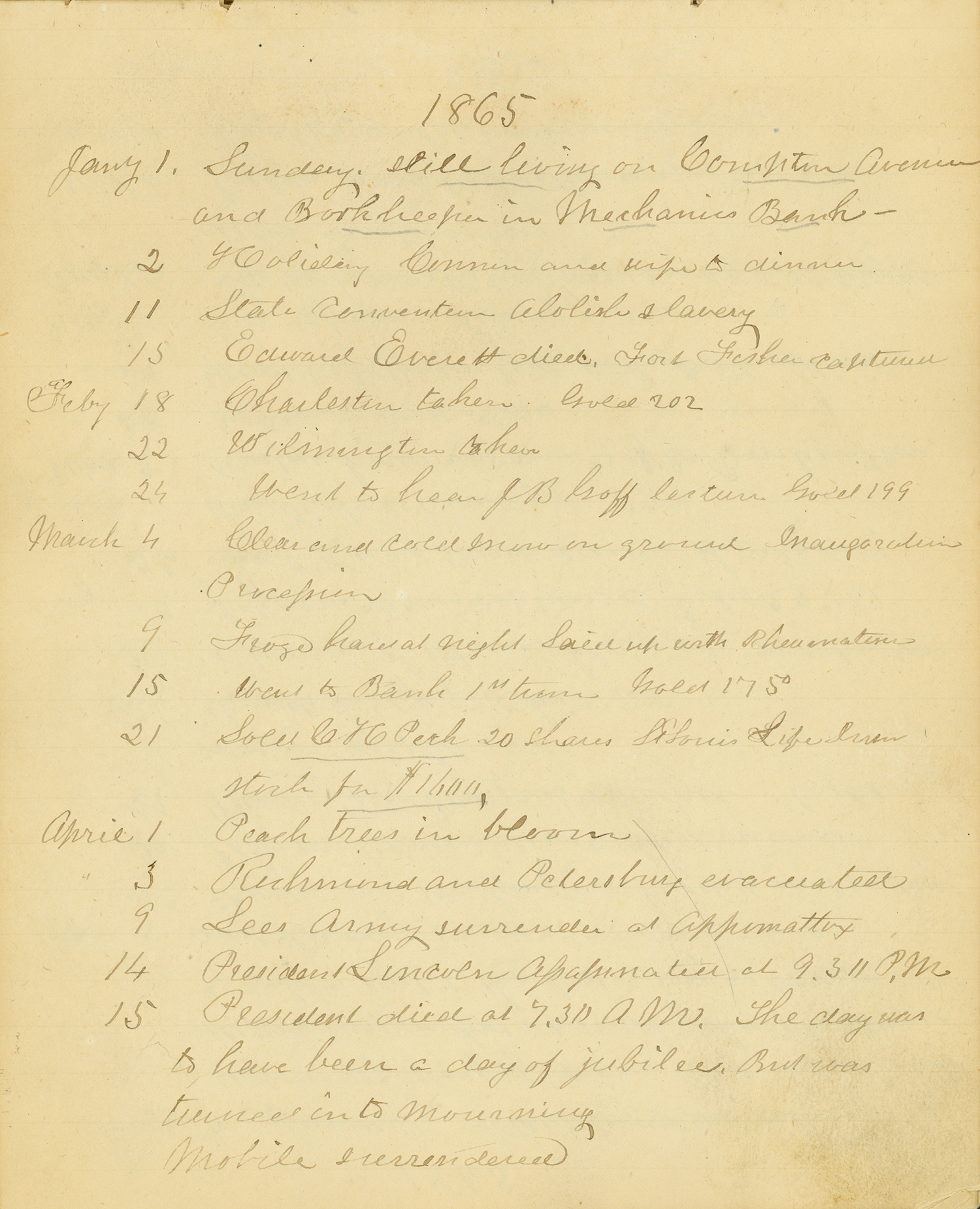
-
Description
Nathan D. Allen was born May 15, 1819, at Watkins Glen, New York, and came to St. Louis in 1837, eventually settling in Webster Groves, St. Louis County, Missouri, where he died May 9, 1903. The diary of Nathan D. Allen contains material on life in Webster Groves, with accounts of the 1849 cholera epidemic and the Civil War in St. Louis, and mentions meeting Abraham Lincoln and Henry Shaw. (Additional information on Allen family was added later by donor.)
-
Source
Missouri History Museum
-
Rights
This item is in the public domain.
-
Creator
Allen, Nathan D., 1819-1903
-
Date
April 16, 1865
from Apr. 19, 1865
Jud M. Bemis to Jenny
-
Full Title
Letter of Jud M. Bemis, St. Louis, to his sister Jenny, April 19, 1865
-
Description
Mentions the death of President Lincoln and the local church services to remember him in St. Louis.
-
Transcription
St. Louis, April 19th, 1865
Dear Sister Jenny,
Your kind letter of Feb 19th to
hand several days since. I wrote Steph last
Saturday the day our noble President expired -
having been shot the night previous - what a
horrible crime. Could any person that would -
commit such a deed have any human blood
in his veins? Was he born of woman or devil?
Lincoln our noble President a second Washington -
in the heart of the American people and -
equal to him as a Statesmen, Patriot and
a Christian, is no more as I write this -
Beth our taking and [?] firing his death
[?] this being his funeral day. Business is
suspended. There are services in all the -
churches doing honor to the [?] dead -
may he rest in peace. [?] may his guardian
spirit watch over the destinies of [?] our
beloved country in this hour of its greatest
period is my [?] prayer -
I am glad to hear
Tammy is getting along so fairly. Do you think she
She will be as strong as though nothing had
ever [?] her? I hope so. I believe I wrote
Steph that Nate and Molly had lost one of
their children. that with Nate’s financials -
troubles must make them feel pretty badly.
Jenny you [?] [?] it
was as my wedding tour. [?] Jenny it was not.
If I ever [?] a wedding tour it will
be to California and that within two years -
Well I guess you will say that I [?] right
to the point - so I am - I know about all of
your love matters. So I will tell you about all of
mine. Well Jenny to [?]. I will say that I am
in love for the first time. Yes for the first time -
I introduced myself to the young lady that I have
chosen for my wife (if I can get her) about
three months ago - you may think it’s strange that
I should introduce myself - when in Boston I was
requested to call on a Boston lady stopping here when I return
home which I agreed to do - I was acquainted
with the gentleman she was stopping with him. He
not being at home when I called - of course I
[?] myself. do not believe in love at first sight
but that or something the under me say as I left
Miss Alice Logswell that evening that I’m thankful for -
[Transcription by: Megan Klein, Rachel Engl's class, Lehigh University.] -
Source
Missouri History Museum
-
Rights
This item is in the public domain.
-
Tags
-
Cite this Item
Bemis, Judson Moss, 1833-1921. "Letter of Jud M. Bemis, St. Louis, to his sister Jenny, April 19, 1865". Remembering Lincoln. Web. Accessed June 30, 2025. https://rememberinglincoln.fords.org/node/307
from Apr. 19, 1865
Letter of Jud M. Bemis, St. Louis, to his sister Jenny, April 19, 1865
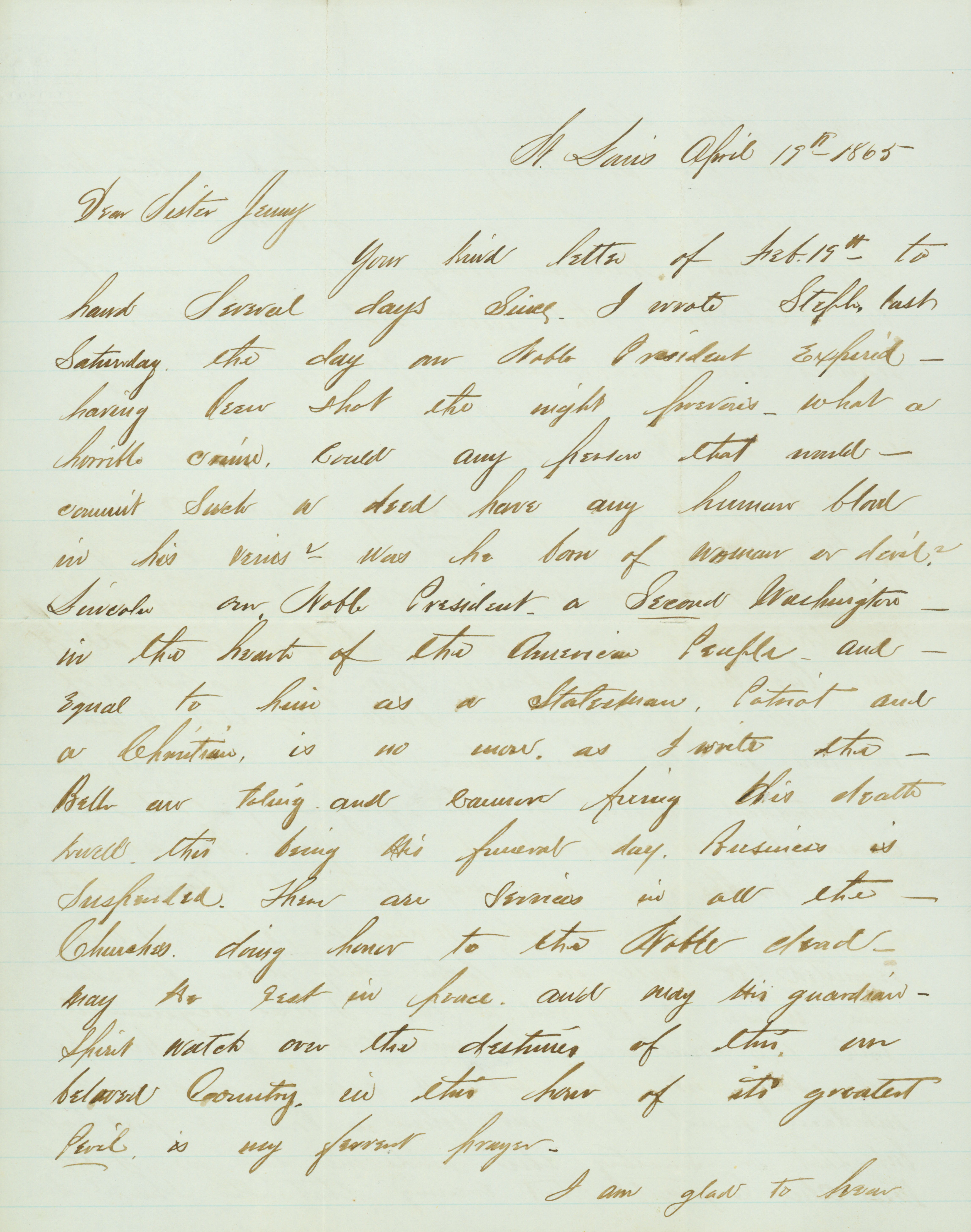
-
Description
Mentions the death of President Lincoln and the local church services to remember him in St. Louis.
-
Source
Missouri History Museum
-
Rights
This item is in the public domain.
-
Creator
Bemis, Judson Moss, 1833-1921
-
Date
April 19, 1865
from May. 4, 1865
E. Rothesay Miller to Theodore Freeley Gale
-
Full Title
Letter of E. Rothesay Miller, "The Monastery," Princeton, to Free [Theodore Freeley Gale], May 4, 1865
-
Description
Regarding his education at Princeton and Abraham Lincoln's body passing through Philadelphia after the assassination. States, ". . . .I was at home for about a week's vacation at the time that our President's body was taken through Philadelphia. I went down Friday afternoon: there was to have been a grand illumination — procession on Monday. The first thing that I heard Saturday Morning before I was dressed was that Lincoln had been murdered. It could hardly be believed. I expected to go see the body Sunday afternoon but my brother — Mr. Hall. . . .started right after breakfast — after three hours hard work got as far as 6th — Chestnut (It was in the State House on Chestnut below 5th.) They were on the corner for an hour — then concluded that they might as well give up. The crowd was so dense that the crystal of my brother's watch was broken (a heavy hunting case). He said every once in a while some woman would faint — she would be passed out over the heads of the crowd. . . ."
-
Source
Missouri History Museum
-
Rights
This item is in the public domain.
-
Tags
-
Cite this Item
Miller, Edward Rothesay. "Letter of E. Rothesay Miller, "The Monastery," Princeton, to Free [Theodore Freeley Gale], May 4, 1865". Remembering Lincoln. Web. Accessed June 30, 2025. https://rememberinglincoln.fords.org/node/311
from May. 4, 1865
Letter of E. Rothesay Miller, "The Monastery," Princeton, to Free [Theodore Freeley Gale], May 4, 1865
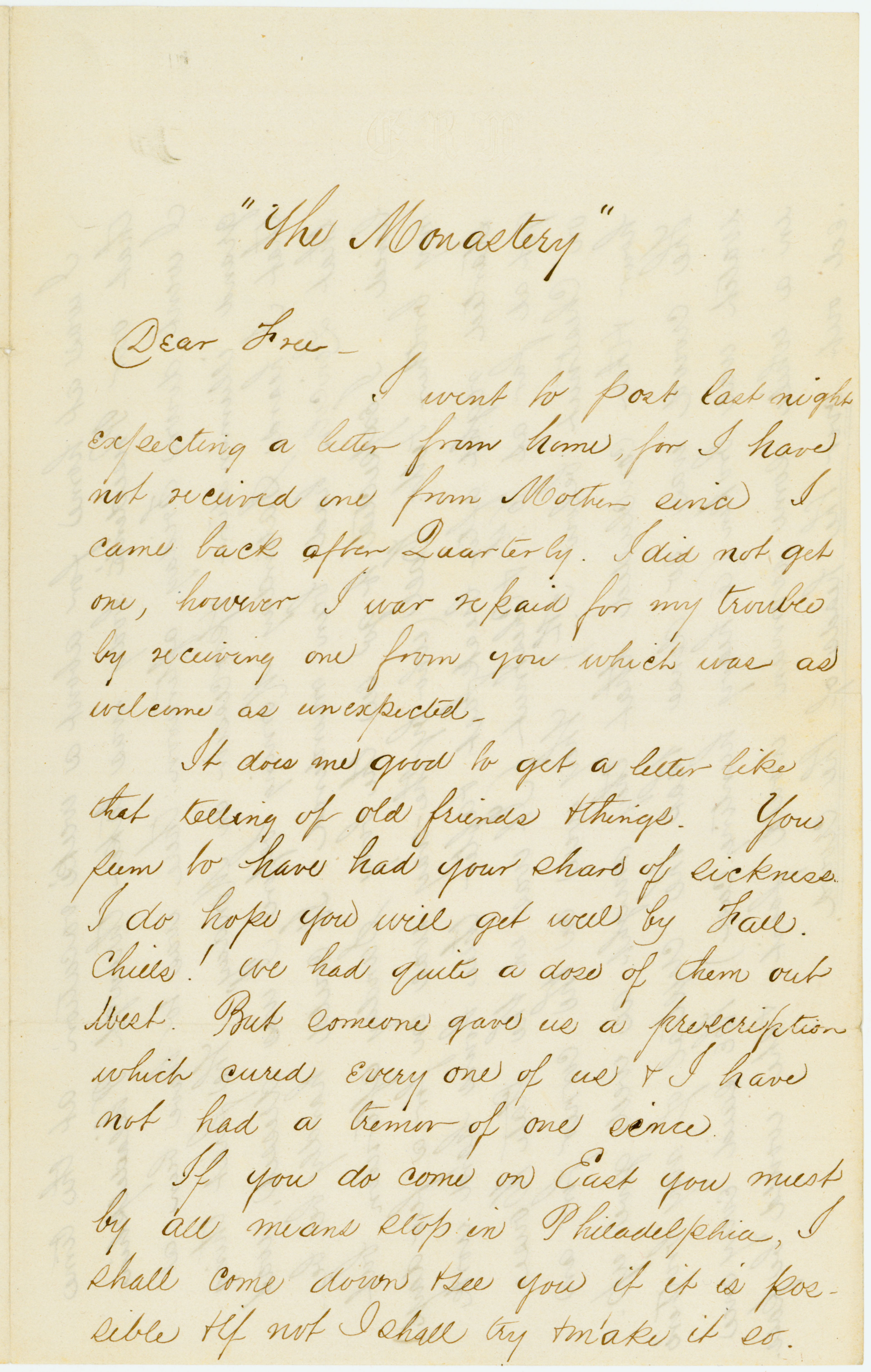
-
Description
Regarding his education at Princeton and Abraham Lincoln's body passing through Philadelphia after the assassination. States, ". . . .I was at home for about a week's vacation at the time that our President's body was taken through Philadelphia. I went down Friday afternoon: there was to have been a grand illumination — procession on Monday. The first thing that I heard Saturday Morning before I was dressed was that Lincoln had been murdered. It could hardly be believed. I expected to go see the body Sunday afternoon but my brother — Mr. Hall. . . .started right after breakfast — after three hours hard work got as far as 6th — Chestnut (It was in the State House on Chestnut below 5th.) They were on the corner for an hour — then concluded that they might as well give up. The crowd was so dense that the crystal of my brother's watch was broken (a heavy hunting case). He said every once in a while some woman would faint — she would be passed out over the heads of the crowd. . . ."
-
Source
Missouri History Museum
-
Rights
This item is in the public domain.
-
Creator
Miller, Edward Rothesay
-
Date
May 4, 1865
from Apr. 14, 1865
Amos Madden Thayer Diary
-
Full Title
Diary of Amos Madden Thayer, March 29-May 12, 1865
-
Description
Amos Madden Thayer was born October 10, 1841, in Chautauqua County, New York. Soon after his graduation from college in 1862, he was commissioned 2nd lieutenant of Company D, 112th New York Infantry. He later transferred to the United States Signal Corps, where he served as 1st lieutenant until the close of the war. Following the war he moved to St. Louis, where he passed the bar and later spent several years as a judge. He died April 24, 1905, in St. Louis.
Includes brief accounts of movements and military operations during the Appomattox Campaign; account of march from Burneville, Virginia, to Washington, D.C.; and final messages that Thayer sent and received, which passed between Generals Meade and Humphreys on April 9, 1865, during the Battle of Sailor's Creek. Also includes letterbook of correspondence from Thayer's law practice in Saint Louis, 1866-1876.
-
Source
Missouri History Museum
-
Rights
This item is in the public domain.
-
Tags
-
Cite this Item
Thayer, Amos Madden, 1841-1905. "Diary of Amos Madden Thayer, March 29-May 12, 1865". Remembering Lincoln. Web. Accessed June 30, 2025. https://rememberinglincoln.fords.org/node/313
from Apr. 14, 1865
Diary of Amos Madden Thayer, March 29-May 12, 1865
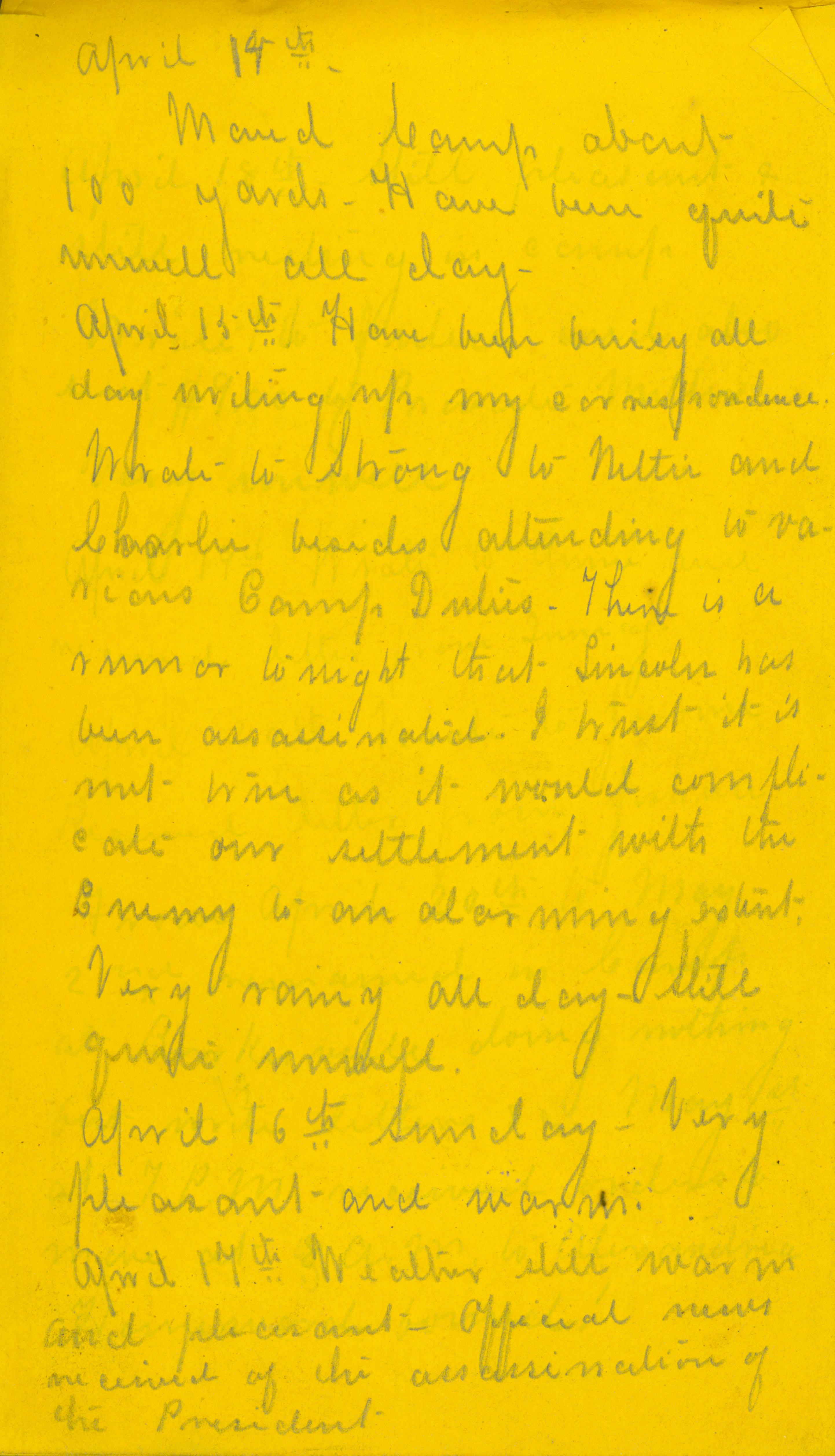
-
Description
Amos Madden Thayer was born October 10, 1841, in Chautauqua County, New York. Soon after his graduation from college in 1862, he was commissioned 2nd lieutenant of Company D, 112th New York Infantry. He later transferred to the United States Signal Corps, where he served as 1st lieutenant until the close of the war. Following the war he moved to St. Louis, where he passed the bar and later spent several years as a judge. He died April 24, 1905, in St. Louis.
Includes brief accounts of movements and military operations during the Appomattox Campaign; account of march from Burneville, Virginia, to Washington, D.C.; and final messages that Thayer sent and received, which passed between Generals Meade and Humphreys on April 9, 1865, during the Battle of Sailor's Creek. Also includes letterbook of correspondence from Thayer's law practice in Saint Louis, 1866-1876.
-
Source
Missouri History Museum
-
Rights
This item is in the public domain.
-
Creator
Thayer, Amos Madden, 1841-1905
-
Date
April 14, 1865
from Apr. 23, 1865
Althea Johnson to Parents
-
Full Title
Letter signed Althea [Althea Johnson] and Clay, St. Louis, to Parents, April 23, 1865
-
Description
Discusses the impact of President Lincoln's death on St. Louis.
-
Source
Missouri History Museum
-
Rights
This item is in the public domain.
-
Tags
-
Cite this Item
Johnson, Althea. "Letter signed Althea [Althea Johnson] and Clay, St. Louis, to Parents, April 23, 1865". Remembering Lincoln. Web. Accessed June 30, 2025. https://rememberinglincoln.fords.org/node/323
from Apr. 23, 1865
Letter signed Althea [Althea Johnson] and Clay, St. Louis, to Parents, April 23, 1865
![Letter signed Althea [Althea Johnson] and Clay, St. Louis, to Parents, April 23, 1865](https://rememberinglincoln.fords.org/sites/default/files/147-Althea%20Johnson%20Letter%2C%20page%201.jpg)
-
Description
Discusses the impact of President Lincoln's death on St. Louis.
-
Source
Missouri History Museum
-
Rights
This item is in the public domain.
-
Creator
Johnson, Althea
-
Date
April 23, 1865
from Apr. 18, 1865
Mary Farren to Solomon F. Smith
-
Full Title
Letter of Mary [Mary Farren], New York, to Uncle Sol [Solomon F. Smith], April 18, 1865
-
Description
Gives her reaction to the assassination of President Abraham Lincoln. States, ". . . .I presume the horrible occurance of last Friday, has thrown a gloom over St. Louis, as everywhere else. I fear the measures were so well taken that the principal criminal will escape. What a dreadful calamity to befall his family. His poor old Mother, had he no human feeling left, that he could crush her in her declining years with such a blow. Edwin [Edwin Booth] it is said is perfectly prostrated. His career in all probability blighted forever. . . .By the way the name of Actor is not in much favor here at present. I was told the Detectives watch them pretty closely. . . ."
-
Source
Missouri History Museum
-
Rights
This item is in the public domain.
-
Tags
-
Cite this Item
Farren, Mary. "Letter of Mary [Mary Farren], New York, to Uncle Sol [Solomon F. Smith], April 18, 1865". Remembering Lincoln. Web. Accessed June 30, 2025. https://rememberinglincoln.fords.org/node/314
from Apr. 18, 1865
Letter of Mary [Mary Farren], New York, to Uncle Sol [Solomon F. Smith], April 18, 1865
![Letter of Mary [Mary Farren], New York, to Uncle Sol [Solomon F. Smith], April 18, 1865](https://rememberinglincoln.fords.org/sites/default/files/Mary%20Farren%20Letter%201.jpg)
-
Description
Gives her reaction to the assassination of President Abraham Lincoln. States, ". . . .I presume the horrible occurance of last Friday, has thrown a gloom over St. Louis, as everywhere else. I fear the measures were so well taken that the principal criminal will escape. What a dreadful calamity to befall his family. His poor old Mother, had he no human feeling left, that he could crush her in her declining years with such a blow. Edwin [Edwin Booth] it is said is perfectly prostrated. His career in all probability blighted forever. . . .By the way the name of Actor is not in much favor here at present. I was told the Detectives watch them pretty closely. . . ."
-
Source
Missouri History Museum
-
Rights
This item is in the public domain.
-
Creator
Farren, Mary
-
Date
April 18, 1865
from Apr. 15, 1865
William B. Napton Diary
-
Full Title
Diary of William B. Napton, February 6, 1863-May 18, 1868
-
Source
Missouri History Museum
-
Rights
This item is in the public domain.
-
Tags
-
Cite this Item
Napton, William Barclay, 1808-1883. "Diary of William B. Napton, February 6, 1863-May 18, 1868". Remembering Lincoln. Web. Accessed June 30, 2025. https://rememberinglincoln.fords.org/node/316
from Apr. 15, 1865
Diary of William B. Napton, February 6, 1863-May 18, 1868
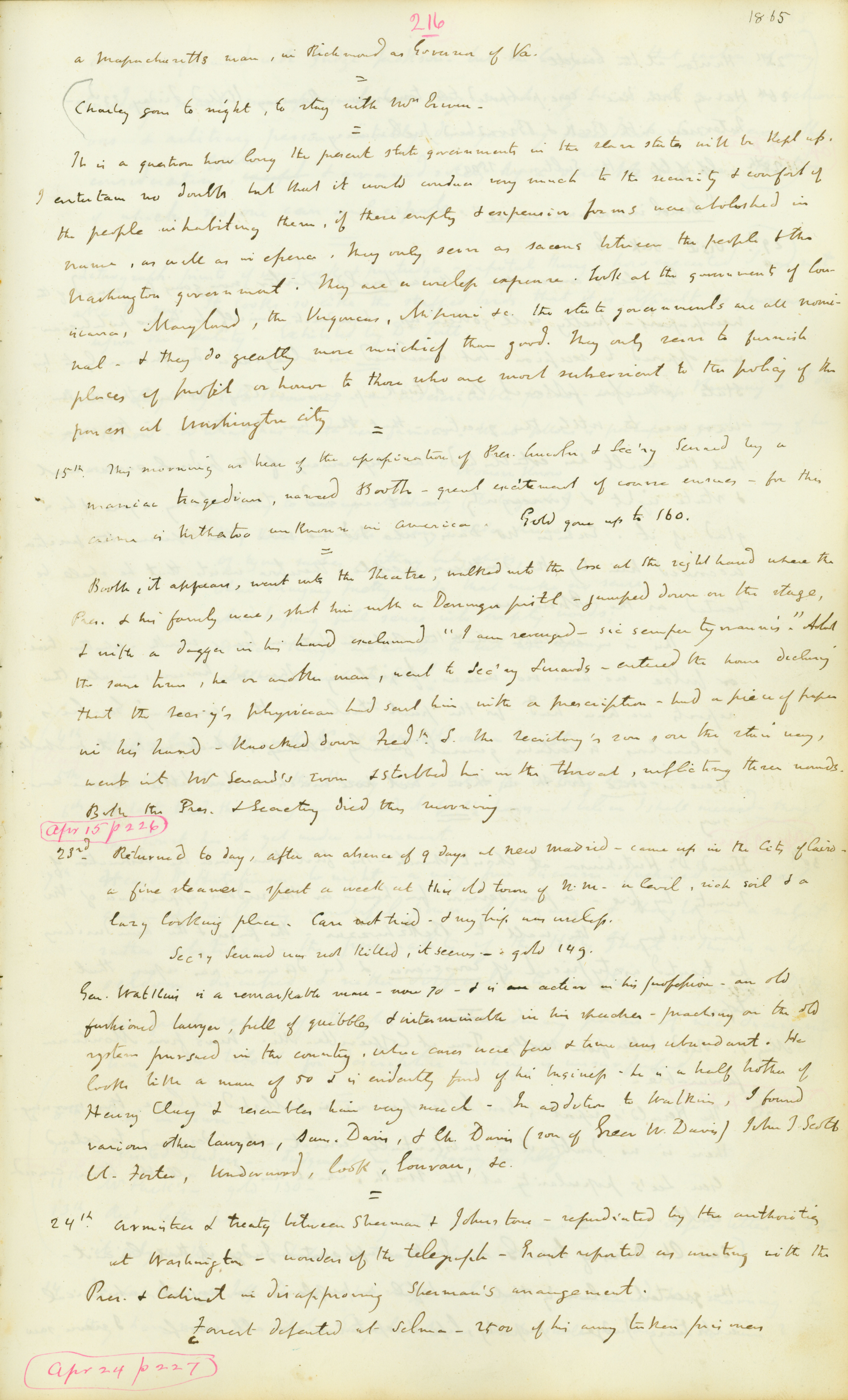
-
Source
Missouri History Museum
-
Rights
This item is in the public domain.
-
Creator
Napton, William Barclay, 1808-1883
-
Date
April 15, 1865
from Apr. 19, 1865
Sallie Thomas to George W. Parker
-
Full Title
Letter of Sallie Thomas, Elizabethtown, Ky., to Brother [George W. Parker], April 19, 1865
-
Description
Discusses the health of the family and mentions the assassination of President Lincoln. Sallie fears that the next president will be even worse than Lincoln was.
-
Transcription
Elizabethtown, Ky,
April 19, 1865
My good Brother,
I received your very kind
letter a few days ago, which was perused
with great interest.
I was sorry to learn that Sis Nellie
and the baby were not well, but
suppose they are well by this time.
And was very sorry to hear of Uncle
James’ illness, hope he has entirely
recovered.
We are all as well usual, but some
of us are complaining all of the
time, I am not very well myself
to day, I suppose you will think
I ought not to complain when
I tell you I weigh a hundred and
forty pounds.
Ma is up again, but her health is
not good at all. I do wish I could
get her out there, once I think it
would help her. The negroes fret her
all of the time, and now they
are twice as bad as they ever were.
Lincoln is dead, and am fearful
we will have a worse President
than he was, and will make
things worse all around.
We are very busy now making the
negroes' spring clothes, and Pa
is behind hand with his work,
it has rained so much this, spring
and he is scared of help, which will
make him, backward with his crop.
Pa tells me every letter I write, to tell
you to, come, and every letter I get
from you, he asks if you are
coming, at last, he said well let
him stay. Ma will drop you a
few lines. Give my love to all
and write soon to your sister
Sallie Thomas.
[Transcription Team: Lance R., Madison H., Kelsey K., Drake W., Jerzi G., Sanja D.]
[New Hampton Middle School]
-
Source
Missouri History Museum
-
Rights
This item is in the public domain.
-
Tags
-
Cite this Item
Thomas, Sallie. "Letter of Sallie Thomas, Elizabethtown, Ky., to Brother [George W. Parker], April 19, 1865". Remembering Lincoln. Web. Accessed June 30, 2025. https://rememberinglincoln.fords.org/node/317
from Apr. 19, 1865
Letter of Sallie Thomas, Elizabethtown, Ky., to Brother [George W. Parker], April 19, 1865
![Letter of Sallie Thomas, Elizabethtown, Ky., to Brother [George W. Parker], April 19, 1865](https://rememberinglincoln.fords.org/sites/default/files/141-Sallie%20Thomas%20Letter%2C%20page%201.jpg)
-
Description
Discusses the health of the family and mentions the assassination of President Lincoln. Sallie fears that the next president will be even worse than Lincoln was.
-
Source
Missouri History Museum
-
Rights
This item is in the public domain.
-
Creator
Thomas, Sallie
-
Date
April 19, 1865
from Apr. 14, 1865
Senator Alexander Ramsey Diary
-
Full Title
Senator Alexander Ramsey's Diary Entries, April 1865
-
Description
Senator Ramsey of Minnesota was in Washington D.C. when President Lincoln was assassinated. These are his diary entries from when it happened, including details as he heard them; being part of President Johnson inauguration; and his participation in the congressional escort on Lincoln's funeral train.
-
Transcription
April 14, 1865
At 10 ½ pm at Fords Theater the Presd. of U.S. was shot by J. Wilkes Booth of which he died. Booth escaped.
Mr. Secretary Seward and his son Frederick and the male servant of the Secretary were attacked (?) at the same time by an accomplice of B. with a knife – and is lingering with little hope of their recovery.
The President died at 7 ½ a.m.
Was present with Hon. Senators Foote of Vt. Gates of Ill. And Steward of Nevada at the inauguration of V. Pres. Johnson as Presd. about 10 in all witnessed the administration of the oath at 11 am by Chf. Justice Chase.
Cigar .30
Newspapers 5 & 16 .21
Boot(?) knife
Paid for use of above senators and myself for carriage 5.00
April 21, 1865
Left Washington as one of a congressional escort in conveying the body of Abm. Lincoln late Presid. of U.S. from Washington to Springfield. Left at 8 a.m. reached Baltimore at 10 and left at 5 PM and reached Harrisburg at 8 pm
(?) Trunk .50
at Baltimore .30
-
Source
Alexander Ramsey and Family Papers, Minnesota Historical Society
-
Rights
Use of this item for research, teaching, and private study is permitted with proper citation and attribution, as Alexander Ramsey and Family Papers, Minnesota Historical Society, Minnesota Historical Society. Reproduction of this item for publication, broadcast, or commercial use requires written permission. For permission, please see this web page.
-
Tags
-
Cite this Item
Alexander Ramsey. "Senator Alexander Ramsey's Diary Entries, April 1865". Remembering Lincoln. Web. Accessed June 30, 2025. https://rememberinglincoln.fords.org/node/292
from Apr. 14, 1865
Senator Alexander Ramsey's Diary Entries, April 1865
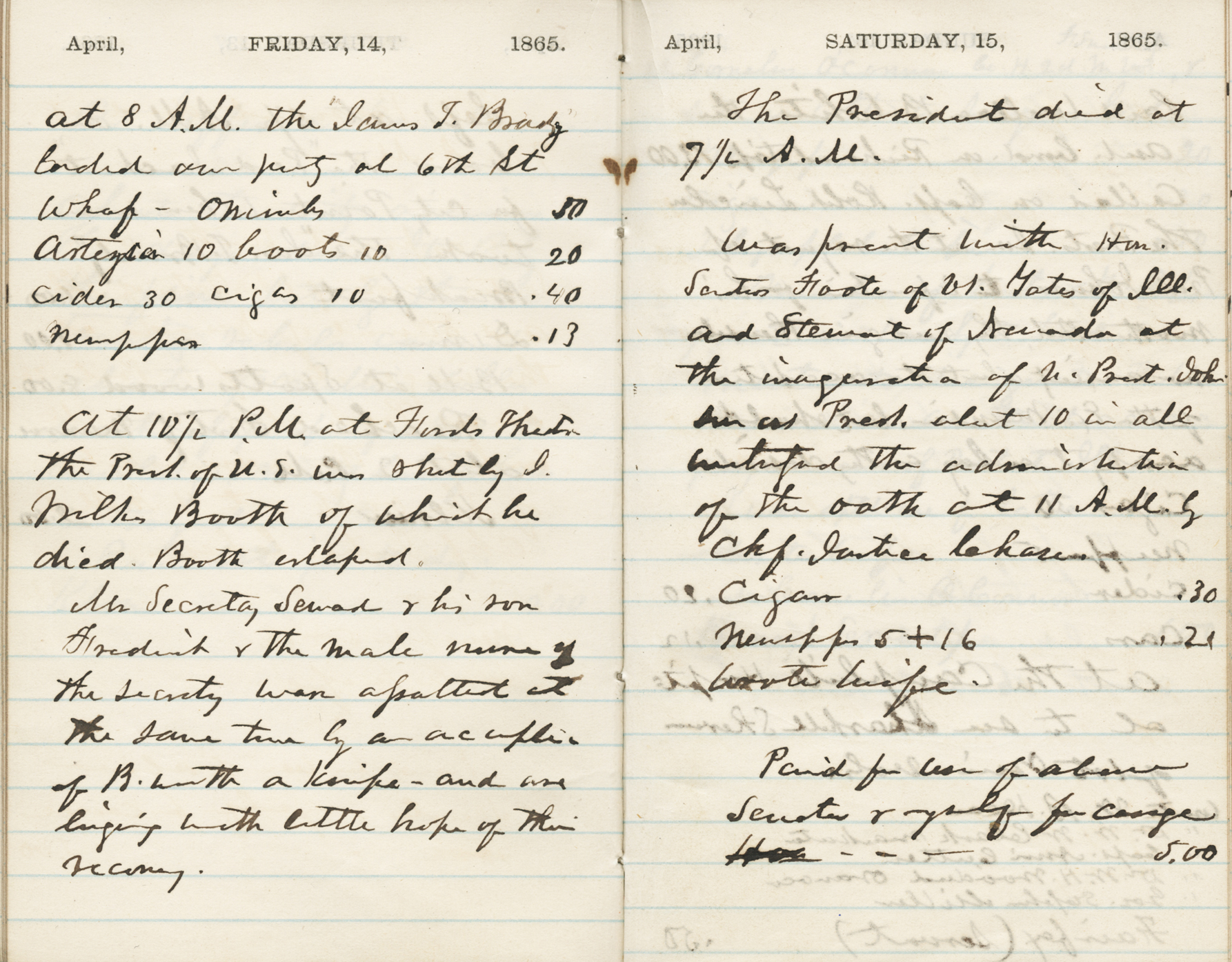
-
Description
Senator Ramsey of Minnesota was in Washington D.C. when President Lincoln was assassinated. These are his diary entries from when it happened, including details as he heard them; being part of President Johnson inauguration; and his participation in the congressional escort on Lincoln's funeral train.
-
Source
Alexander Ramsey and Family Papers, Minnesota Historical Society
-
Rights
Use of this item for research, teaching, and private study is permitted with proper citation and attribution, as Alexander Ramsey and Family Papers, Minnesota Historical Society, Minnesota Historical Society. Reproduction of this item for publication, broadcast, or commercial use requires written permission. For permission, please see this web page.
-
Creator
Alexander Ramsey
-
Date
April 14, 1865
